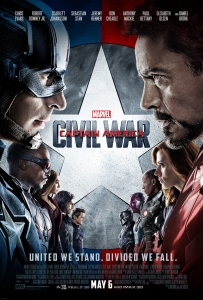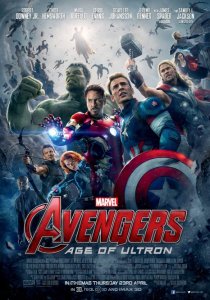 Marvel’s head-honchos must’ve spent years dreaming up this moment. It’s the moment when Captain America, Iron Man and 10 other superheroes all dash at one another in anticipation of an epic death match. This battle is why we’ve sat through these movies since 2008, and it’s everything fans could’ve asked for.
Marvel’s head-honchos must’ve spent years dreaming up this moment. It’s the moment when Captain America, Iron Man and 10 other superheroes all dash at one another in anticipation of an epic death match. This battle is why we’ve sat through these movies since 2008, and it’s everything fans could’ve asked for.
And whether you’re a fan or not, that may be enough. This particular scene, what is really a sizable chunk of “Captain America: Civil War,” stands out because it’s all these heroes at their best and having a blast. Paul Rudd’s Ant-Man is clambering through Iron Man’s circuitry, Tom Holland’s Spider-Man is web-slinging and talking wise as Chris Evans’s Captain America manages to drop a building on him, and Chadwick Boseman’s Black Panther is sleek, acrobatic and menacing. They’re not trying to kill each other, but are really just having fun.
“I don’t know how many fights you’ve been in, but there usually isn’t this much talking,” Falcon says to Spidey, who really does breathe a lot of life into this film. Except that’s not entirely true. For a long time now, Marvel has been making sensational action sequences that look and feel exactly like this one: rapid fire action editing that resembles comic book panels rather than cinema, carefully allotted portions of screen time for every hero involved, and a bunch of quippy Whedonisms tossed in between the mayhem.
So if this fight really is the best thing Marvel has ever made, is that really saying much?
To be fair, the Captain America movies are arguably a step up from its Iron Man or Thor counterparts. I’d rather watch Cap and Black Widow engage in some Jason Bourne style hand-to-hand combat than watch Tony Stark shoot lasers at swarms of CGI robots.
But regardless of who the participants are, every Marvel movie ever made feels exactly the same. Each one has been polished and tailored to fit a brand image, and they’ve been rubbed clean of their style, emotion and ambition. Anthony and Joe Russo may be listed as directors here, but these movies don’t have directors, just brand managers. It’s meant movies that are perfectly competent, enjoyable and disposable: almost never bad, but almost certainly never great.
In “Civil War,” when Scarlet Witch (Elizabeth Olsen) bungles a mission in Lagos that leaves 12 civilians killed, the Avengers are brought before an oversight committee to be kept in check by the United Nations. Iron Man and Black Widow both agree to sign the sanctions, but Captain America believes they would be surrendering their right to choose.
Not unlike the recent “Batman v. Superman,” it makes boardroom discussions, MSNBC talking heads and debates about morality the stuff of blockbusters. Say what you will about that film, but Zack Snyder is a filmmaker with a voice and a style behind the camera. He invoked Greek mythology and Christ parables in order to argue his ideas, and he made Bruce Wayne far more of a tortured soul than the narcissist Tony Stark ever could be.
“Civil War” is entirely paint by numbers with simplistic, reductive writing. Is this movie really about anything other than vengeance? It bungles its libertarian political overtones by trying to straddle the line and appeal to a mass audience, and it proves yet again that Marvel has very little clue what to do with its villains. “Batman v. Superman” didn’t have a sense of humor, but so what if “Civil War” does?
When has this franchise ever made you feel anything beyond a giggle? Marvel has never been one to make you afraid, sad or joyful, to pay homage to a genre, or even to truly care for the fate of these characters. It’s for the same reason that Marvel movies only look like other Marvel movies. By making them all uniformly bland with glimmers of excitement and pathos, they can tease you for the next one.
Where can the franchise go after a dozen superheroes have all fought in an epic battle? If all we keep getting is more of the same, does it really matter?
3 stars
 Marvel has been branding their Cinematic Universe in such a way that each subsequent film teases the next, and all seem to be building to something. “Avengers: Age of Ultron” should be that moment, but it doesn’t feel like the culmination of all that’s come before. Worse, it doesn’t even feel like an “Avengers” movie.
Marvel has been branding their Cinematic Universe in such a way that each subsequent film teases the next, and all seem to be building to something. “Avengers: Age of Ultron” should be that moment, but it doesn’t feel like the culmination of all that’s come before. Worse, it doesn’t even feel like an “Avengers” movie.